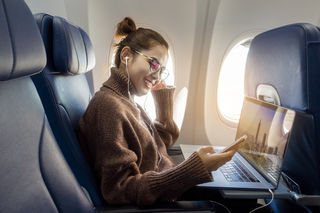Fear
6 Strategies to Help You Conquer Your Fear of Flying
There's no need to stick to road trips just because you fear airplanes.
Posted February 10, 2020 Reviewed by Lybi Ma

Over a century ago, the Wright Brothers made it possible for humans to have the freedom to fly above the earth like a bird. But, many people still shudder at the thought of taking flight.
If you're scared to fly, you might be tempted to insist you prefer to drive. Or, you might pretend you don't care that you're missing out on island adventures with friends and family. But, there's no need to stick to road trips just because airplanes send chills down your spine.
You can conquer your fear of flying if you really want to. As a mental strength coach and psychotherapist, here's how I help people conquer their fear of flying:
1. Learn About Flying
We have all seen the unfortunate, breaking news stories of plane crashes when they happen. However, part of the reason these news stories are so big is that plane crashes are so rare. In fact, there is an average of over 100,000 flights on any given day that are successful.
Having a better understanding of this and other facts about flying can help you alleviate some of your fear. Educate yourself about airplanes, how they work, and how unlikely they are to experience a problem.
Read a book, look at pictures of planes, and watch documentaries about air flight. For some, learning about airplanes is anxiety-provoking and forcing themselves to tolerate that anxiety may actually make it easier to step onto an airplane later on.
2. Accept and Acknowledge Your Anxiety
The fear of flying causes many people to avoid flying altogether. However, just because you feel anxious doesn't mean you can't fly.
Anxiety is uncomfortable but tolerable. So you don't need to wait until you're 100 percent relaxed before you can buy a ticket.
Acknowledge that you feel anxious and accept that the fear of flying is a common issue. Your anxiety is a sign that you shouldn't fly. Instead, it's normal to experience some fear as you think about taking flight.
3. Exposure Therapy
It's unlikely you will overcome your fear if you continue to avoid flying. But don't jump on an overwhelming 20-hour flight right away. Start with something short, and gradually increase your exposure one flight at a time.
You might even want to do something plane-related that only stirs up some minor anxiety. If you have a serious phobia, this could simply mean watching movies or even looking at pictures of planes. Or, you might take a little time to go to an airport and watch planes take off.
Imagining yourself taking a flight can be a helpful step too. Repeated exposure to mild anxiety-provoking situations can help you gradually increase your courage. Take things one step at a time until you can work yourself up to a short flight.
4. Relaxation Techniques
Anxiety manifests itself in several ways. When people feel anxious they can even develop physical symptoms of anxiety. Shaking, sweating, an increased heart rate, and nausea are some of the most common physical symptoms associated with anxiety.
To avoid these, learn some relaxation techniques that you can practice during your flight. They can help calm your mind and in turn your body as well. Meditation and deep breathing are two effective ways to help reduce the physical symptoms commonly associated with anxiety.
Another skill that can help calm you is guided imagery. This can simply involve imagining a peaceful scene to help your mind and body take a break from the situation at hand.
5. Medicate Yourself
While you don't want to take a new anti-anxiety medication for the first time right before you get on a flight, medication can be an option.
Talk to your doctor about your fears. Discuss the pros and cons of using a prescription to help you manage your anxiety.
This can be especially helpful if you're short on time and need to take a flight. If you must fly to a family member's funeral, for example, you might not have the time or energy to work on exposure therapy.
6. Create a Flight Plan
Develop a plan to help you handle your anxiety during the flight. For example, plan to read a good book or listen to relaxing music during the flight. These distractions may help you overcome your fears.
Also, plan carefully who you'll be flying with. Choose a companion who enjoys flying and one that will be understanding of your anxiety. Just having someone with you that you trust may help calm a lot of your fears.
And plan ahead for anxiety. Create a plan that states what you'll do when you feel anxious. Whether you listen to music or talk to your companion, just knowing that you have a plan for your anxiety can help.
Seek Professional Help When Needed
If your fear of flying impacts your life, in a negative way, and you're not able to overcome your fears on your own, seek professional help. Psychotherapists are trained in helping people overcome fears and phobias, such as the fear of flying.




